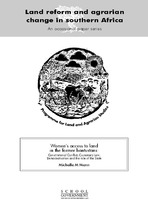Women's access to land in the former Bantustans: Constitutional conflict, customary law, democratisation and the role of the state
Abstract
The transition to local democratic institutions in the former bantustans of South Africa will not in itself fulfill the constitutional imperative for the promotion of gender equality, specifically in relation to women's access to land. In order for the state to balance its competing constitutional obligations, it must undertake a programme of community education, consciousness-raising, and support for women's organisation at the grassroots level. This paper provides an overview of land tenure in the former bantustans, focusing on the access of rural women to this land. It examines the potential conflict between the constitutional recognition and protection of gender rights on the one hand and the recognition of customary law/ traditional leadership on the other, especially the adverse impact of customary law and traditional leadership on the access of rural women to land. It then examines state initiatives towards implementing local democratic institutions in these areas, and considers whether these initiatives are sufficient to fulfill the state's obligation to promote gender equality. The paper concludes that state support for community activism and community education can serve to balance the constitutional imperatives for gender equality and respect for traditional leaders and customary law. Such an approach would allow the community to be active participants in, and the drivers of their own development.

